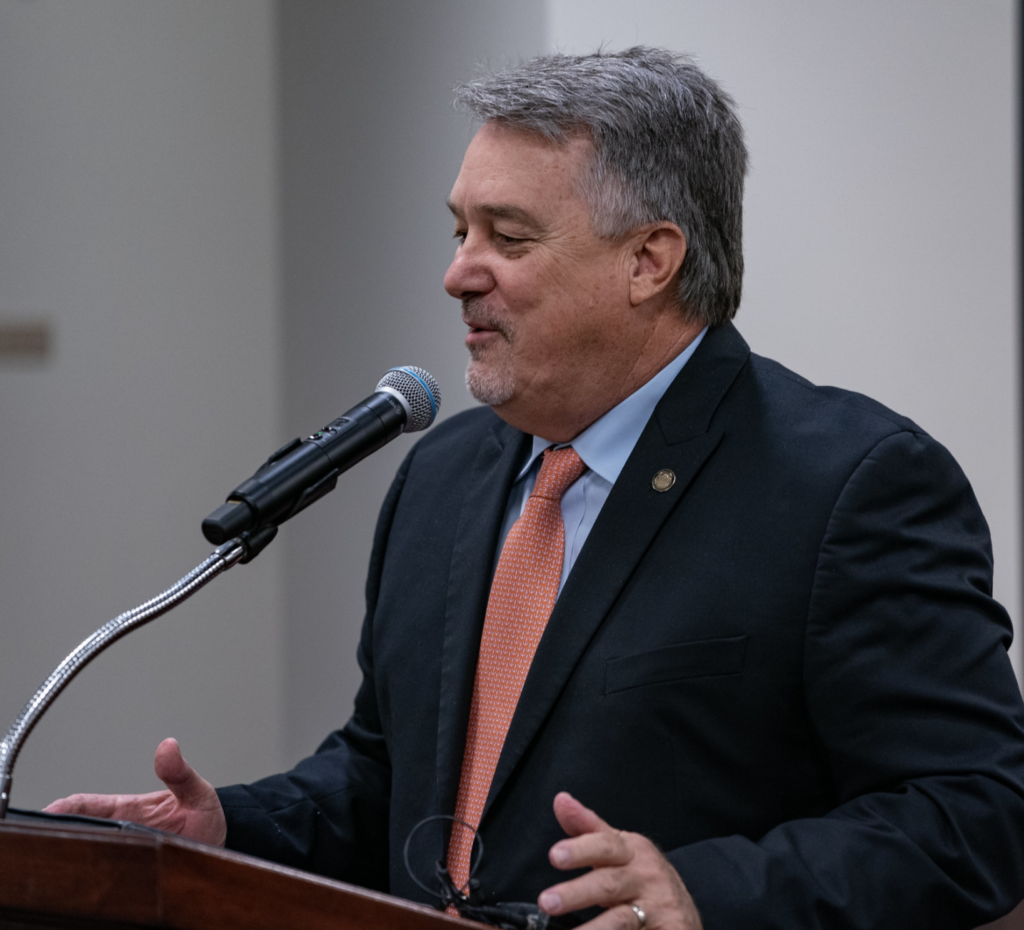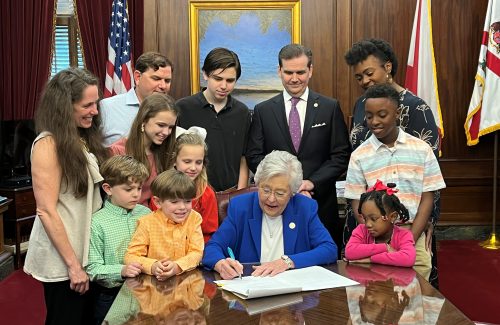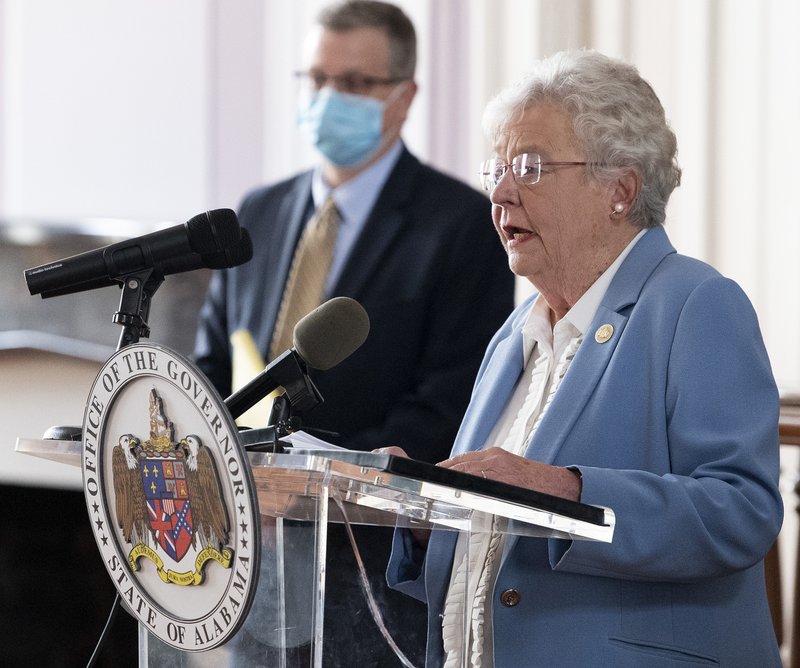Speaker Nathaniel Ledbetter appoints House Members to serve on a study commission evaluating Alabama’s labor force participation

Alabama has the lowest unemployment rate in state history. There are job openings all over the state that businesses and governments cannot fill, yet the state has one of the country’s worst labor force participation rates. That Alabamians are choosing to stay home rather than join the booming economy has increasingly perplexed state leaders. “Despite having one of the lowest unemployment rates in the country and a record number of Alabamians working, the percentage of Alabamians participating in the labor force is lower than almost any other state,” Governor Kay Ivey wrote recently. “While we are increasing that by the tens of thousands, we have to change this statistic. Getting folks off the sidelines and into the labor force is my next priority.” On Monday, Speaker of the House Nathaniel Ledbetter announced members of the Alabama House of Representatives that will serve on an ad hoc committee studying Alabama’s labor force participation rates and identifying barriers to workforce entry. “Alabama is witnessing record-breaking economic growth and historically low unemployment rates,” Ledbetter said. “Despite these numbers, in Alabama, there are roughly 140,000 job openings and, at the same time, 48,834 unemployed workers across our state. That means we are lacking nearly 100,000 workers over 16 years old, which puts our labor force participation rate at a mere 57 percent—one of the lowest rates in the entire country.” The House members appointed to serve on the study commission will be Rep. Reed Ingram (R–Pike Road), who will serve as the Chairman of the Committee. Rep. Danny Garrett (R–Trussville); Rep. Donna Givens (R–Robersdale); House Minority Leader Anthony Daniels (D–Huntsville); Rep. James Lomax (R–Huntsville); Rep. Barbara Drummond (D–Mobile); Rep. Mike Kirkland (R–Scottsboro); Rep. Bill Lamb (R–Tuscaloosa); Rep. Kelvin Lawrence (D–Hayneville); Rep. Curtis Travis (D–Tuscaloosa); Rep. Chris Pringle (R–Mobile); Rep. Matt Woods (R–Jasper); Rep. Wes Kitchens (R–Guntersville); Rep. Jim Carns (R–Birmingham); and House Majority Leader Scott Stadthagen (R–Hartselle). “Over the coming months, it will be imperative for this group to build on the progress of, and collaborate with, existing entities such as the Lt. Governor’s Commission on 21st Century Workforce, the Alabama Community College System, Alabama higher-education institutions, and essential stakeholders across the private sector,” Ledbetter said. The study commission is expected to address areas including extending adequate childcare to families, examining the correlation between productivity growth and labor output, ensuring wages and salaries are competitive, addressing workforce housing concerns, and offering improved and more expansive mental health programs and services to citizens. “An insufficiency of resources such as these creates barriers to workforce entry as much as an absence of quality education,” Ledbetter postulated. The study commission is slated to host their first meeting on Thursday, October 5, at 10:00 a.m. in room 617 of the Alabama State House. To connect with the author of this story or to comment, email brandonmreporter@gmail.com.
Nathaniel Ledbetter announces House members who will serve on labor force participation study

With unemployment still sitting at a record low of 2.1%, the state is looking for ways to increase the number of Alabamians in the workforce. Speaker of the House Nathaniel Ledbetter announced on Monday key House members that will serve on an ad hoc committee studying Alabama’s labor force participation rates and identifying barriers to workforce entry. In July, Gov. Kay Ivey said labor force participation was a top priority. “Despite having one of the lowest unemployment rates in the country and a record number of Alabamians working, the percentage of Alabamians participating in the labor force is lower than almost any other state,” Gov. Ivey wrote in an op-ed. “While we are increasing that by the tens of thousands, we have to change this statistic. Getting folks off the sidelines and into the labor force is my next priority.” In September, Alabama Department of Labor Secretary Fitzgerald Washington announced that Alabama’s Labor Force Participation Rate (LFPR) rose only slightly in August to 57.0%. This is up from last August’s rate of 56.9%. “Alabama is witnessing record-breaking economic growth and historically low unemployment rates,” Ledbetter said in a press release. “Despite these numbers, in Alabama, there are roughly 140,000 job openings and, at the same time, 48,834 unemployed workers across our state. That means we are lacking nearly 100,000 workers over 16 years old, which puts our labor force participation rate at a mere 57 percent—one of the lowest rates in the entire country.” “Yet again, we are announcing record-breaking economic statistics this month,” said Secretary Washington. “While our labor force participation rate remained unchanged, we are continuing to work with marginalized groups to get them into our labor force.” The House Members serving on the study commission will be Rep. Reed Ingram (R–Pike Road) – Chairman; Rep. Danny Garrett (R–Trussville); Rep. Donna Givens (R–Robersdale); Rep. Anthony Daniels (D–Huntsville); Rep. James Lomax (R–Huntsville); Rep. Barbara Drummond (D–Mobile); Rep. Mike Kirkland (R–Scottsboro); Rep. Bill Lamb (R–Tuscaloosa); Rep. Kelvin Lawrence (D–Hayneville); Rep. Curtis Travis (D–Tuscaloosa); Rep. Chris Pringle (R–Mobile); Rep. Matt Woods (R–Jasper); Rep. Wes Kitchens (R–Guntersville); Rep. Jim Carns (R–Birmingham); Rep. Scott Stadthagen (R–Hartselle). “Over the coming months, it will be imperative for this group to build on the progress of, and collaborate with, existing entities such as the Lt. Governor’s Commission on 21st Century Workforce, the Alabama Community College System, Alabama higher-education institutions, and essential stakeholders across the private sector,” stated Ledbetter. Some specific areas the study commission will address are extending adequate childcare to families, examining the correlation between productivity growth and labor output, ensuring wages and salaries are competitive, addressing workforce housing concerns, and offering improved and more expansive mental health programs and services. “An insufficiency of resources such as these creates barriers to workforce entry as much as an absence of quality education,” Ledbetter concluded.
Public meetings on congressional redistricting announced

On Wednesday, State Sen. Steve Livingston (R-Scottsboro) and State Rep. Chris Pringle (R-Mobile), who serve as the joint chairs of the Permanent Legislative Committee on Reapportionment, announced a series of meetings and deadlines on the looming congressional redistricting. The first meeting will be on June 27 at 1:30 P.M. in the Alabama State House Room 200. This will be a meeting of the Joint Committee and a public hearing. People unable to attend can watch the proceedings online at the Legislature’s website. July 7 at 5:00 P.M. is the deadline for all plans to be submitted to the Reapportionment Committee. You can contact the committee directly by email at: district@alsenate.gov. The committee will meet again and hold a public hearing on July 13 at 1:30 P.M. in State House Room 200. On August 14, there will be a hearing at Hugo L. Black United States Courthouse in Birmingham. The House members serving on the Permanent Legislative Committee on Reapportionment members include Cynthia Almond (R-Tuscaloosa); Barbara Boyd (D-Anniston); Jim Carns (R-Birmingham); Steve Clouse (R-Ozark); Corley Ellis (R-Columbiana); Chris England (D-Tuscaloosa; Laura Hall (D-Huntsville); Sam Jones (D-Mobile); Joe Lovvorn (R-Auburn); and Rex Reynolds (R-Huntsville). In 2022 a three-judge panel of the Eleventh Circuit Court of Appeals rejected Alabama’s 2021 congressional redistricting as being in violation of the Voting Rights Act of 1965—the U.S. Supreme Court, which earlier this month agreed. The three-judge panel has given the Legislature until the middle of next month to submit a new congressional redistricting plan to the federal court. The three-judge panel has ordered the Legislature to submit a new map with two majority-minority districts or something as close to that as possible. Alabama Governor Kay Ivey is expected to call a special session no later than July 17 to attempt to comply with the court order. If the Legislature cannot reach an agreement on a redistricting plan by July 21, or the Court does not like the State’s plan, then the three-judge panel may appoint a special master to draw the districts for the State. Republicans currently control six of Alabama’s congressional seats, while Democrats control only the Seventh Congressional District. None of the seven congressional races were competitive during last year’s general election. The redistricting could make two of those districts winnable for Alabama Democrats. It could also cost Democrats a seat if they make it too competitive. To connect with the author of this story or to comment, email brandonmreporter@gmail.com.
Nathaniel Ledbetter announces appointments to the Reapportionment Committee

On Tuesday, Speaker of the House Nathaniel Ledbetter announced that he had appointed a number of House members to serve on the Permanent Legislative Committee on Reapportionment. The House members appointed are: Cynthia Almond (R-Tuscaloosa) Barbara Boyd (D-Anniston) Jim Carns (R-Birmingham) Steve Clouse (R-Ozark) Corley Ellis (R-Columbiana) Chris England (D-Tuscaloosa) Laura Hall (D-Huntsville) Sam Jones (D-Mobile) Joe Lovvorn (R-Auburn) Chris Pringle (R-Mobile) Rex Reynolds (R-Huntsville). Since this is a joint committee, it is also made up of members of the Senate. The appointment of 11 members from the House would indicate an expansion of the committee. According to the committee website, the joint committee has just six members: Sens. Steve Livingston, Dan Roberts, and Bobby Singleton, and Reps. Kyle South, Laura Hall, and Chris Pringle. South is leaving the Legislature at the end of the month to accept a position as President and CEO of the West Alabama Chamber of Commerce. Presumably, the Senate will now appoint another eight joint committee members. The Joint Committee on Reapportionment normally redistricts the congressional districts, the state board of education districts, and legislative districts every ten years following the decennial census. In 2022 a three-judge panel of the Eleventh Circuit Court of Appeals rejected Alabama’s 2021 congressional redistricting as being in violation of the Voting Rights Act of 1965. Alabama appealed to the U.S. Supreme Court, which earlier this month found that the lower court was correct in its interpretation and has restored the lower court’s ruling that the state is in violation of the Voting Rights Act. The three-judge panel has given the Legislature until the middle of next month to submit a new congressional redistricting of the state to the federal court. The three-judge panel has ordered the Legislature to submit a new map where there are two majority-minority districts or something as close to that as possible. Alabama Governor Kay Ivey is expected to call a special session no later than July 17 to attempt to comply with the court order. If the Legislature cannot reach an agreement on a redistricting plan by July 21 or the Court does not like the State’s plan, then the three-judge panel may appoint a special master who will draw the districts for the state. Republicans currently control six of Alabama’s congressional seats, while Democrats control only the Seventh Congressional District. None of the seven congressional races were competitive in the general election last year. The redistricting could make two of those districts winnable for Alabama Democrats. To connect with the author of this story or to comment, email brandonmreporter@gmail.com.
Legislators seek a bailout of Birmingham Southern College

Members of the Jefferson County Legislative delegation met on Monday at Birmingham Southern College (BSC) to discuss their proposal to take $30 million of state dollars and give that to the struggling liberal arts college near Legion Field in Birmingham. The meeting was called by State Sen. Jabo Waggoner and State Rep. Jim Carns. “This plan includes a $30 million one-time infusion from the State of Alabama ($12.5 million from ARPA and $17.5 million from the Education Trust Fund). Along with smaller grants from the City of Birmingham ($5 million) and Jefferson County ($2.5 million), this infusion will cover projected deficits through May 31, 2026,” Waggoner and Carns wrote. “Without support from the state, the college will not be able to continue to operate past May 2023. Without a commitment from the state, the college will need to notify high school seniors that they will no longer be accepting applications by the middle of January.” The college released a statement acknowledging the dire straits that the school faces. “Over the past 18 months, BSC President Daniel Coleman has secured firm commitments from hundreds of private donors for $45 million toward a goal of raising $200 million by May 2026 to refresh its endowment fund. This is a remarkable demonstration of support for BSC and a reflection of the fact that the college is important—not only to Birmingham but to the State of Alabama. In order to allow sufficient time for this fund-raising effort to succeed and to give BSC breathing room to operate, we are seeking a one-time contribution of $12.5 million from the second tranche of the American Rescue Plan Act and $17.5 million from the Education Trust Fund (ETF). BSC is also asking for a commitment of $5 million from the City of Birmingham and $2.5 million from Jefferson County. We believe Birmingham-Southern College’s contributions to the greater Birmingham area and the state warrant such an investment, which is clearly permissible under state law and for which there is considerable precedent.” Coleman briefed legislators on his plan. “We believe with the time that the state funds will give us, we can gain support from the other 16,000 graduates we have not contacted as well as the many thousands of people and organizations of this state who appreciate the value of this College,” Coleman said. “Our target of $200 million of pledges by May 2026 is achievable, especially with our $45.5 million head start. Such an endowment will give us the financial stability that this college needs to thrive.” The administration blames its current financial distress on a “building program in the mid-2000s that drew heavily upon the endowment and caused the college to take on significant debt. The financial crisis of 2008-2009 and an error in the accounting of federal financial aid further depleted the college’s resources.” At the meeting on Monday, State Sen. Rodger Smitherman and State Rep. Juandalynn Givan added their bipartisan support to the bailout of the private college. “This is the urgency of now,” said Rep. Givan. “To lose Birmingham-Southern would be a travesty for all of us.” When Judson College in Marian County ran into financial trouble, the Legislature allowed the college to fail in 2021. Some Judson alums have asked why the state would bail out BSC and did nothing to save Judson. Birmingham-Southern College was founded back in 1898 as Birmingham College. Most of its students come from Alabama, and 28% self-identify as either African-American or Hispanic. In addition to potential state support, the school will need to raise about $150 million more to be back on its feet by 2026. At the meetings, the legislators said they plan to present their plan to bail out the struggling private liberal arts college to Alabama Governor Kay Ivey in the coming weeks. To connect with the author of this story, or to comment, email brandonmreporter@gmail.com.
Nathaniel Ledbetter announces a second round of House committee chairs

State Rep. Nathaniel Ledbetter announced his second round of committee chairs on Monday. Ledbetter is the Alabama House Republican Caucus choice to be the next Speaker of the House in the Alabama House of Representatives, and under the rules of the Legislature, the Speaker appoints most of the committee chairs. Ledbetter announced the appointment of Rep. Jim Carns to serve as Chair of the House Commerce and Small Business Committee, a role he previously held under outgoing Speaker Mac McCutcheon. Carns served in the state legislature from 1990 to 2006. From 2006 to 2010, he served on the Jefferson County Commission. He returned to the House in 2011. Carns is a businessman with experience in manufacturing. Ledbetter announced the appointment of State Rep. Margie Wilcox to chair the Boards, Agencies, and Commissions Committee. Wilcox returns for her third consecutive term in the Legislature. During the last quadrennium, Wilcox chaired the Alabama Legislature’s Joint Transportation Committee and the Joint License Plate Oversight Committee. Wilcox owns and operates a taxicab company in Mobile. She has previously served as vice chair of the House County and Municipal Government Committee. Rep. Danny Crawford returns as the Agriculture and Forestry Committee chair. Crawford was elected to the Alabama House in a 2016 special election. He served on the Athens City Council from 1993-2005 and was employed with the Farm Service Agency for 33 years. He was appointed state director by President George W. Bush in 2001. State Rep. Reed Ingram will return as the chair of the County and Municipal Government Committee. Ingram served in the House since 2014 and was the chair of the County and Municipal Government Committee since 2018. Ingram is a well-known businessman and restauranter from Montgomery. He previously served on the Montgomery County Commission from 2004 to 2014. Ledbetter is appointing State Rep. Randall Shedd to chair the Transportation, Utilities, and Infrastructure Committee. Shedd has served in the House since 2013. He previously served as the chairman of the Cullman County Commission and as the mayor of Fairview. He worked as the director of the Cullman County Commission on Aging. Shedd previously chaired the House Urban and Rural Development Committee and was vice chair of the House Children and Senior Advocacy Committee. “From rural to urban areas, from employers to employees, and from tradesmen to consumers, the collective decisions made by these committees affect every Alabamian in some manner,” Ledbetter said. “All of these individuals have my full faith and confidence, and I am certain they will always work on behalf of the citizens each of us seek to serve.” Ledbetter has previously announced his first round of appointments. All of these appointments are conditional on Ledbetter being selected as Speaker in the organizational session of the House of Representatives in January. Since Republicans hold a 77-member supermajority in the 105-member Alabama House, it is highly likely that Ledbetter will be selected as Speaker, so will then be able to make these appointments officially. Ledbetter has served in the House since 2014. He previously was the Mayor of Rainsville and has served on the town council. He has worked for the Sand Mountain Electric Cooperative as accounts manager. To connect with the author of this story, or to comment, email brandonmreporter@gmail.com.
Amendment Four would ban changing Alabama election law within six months of an election

Voters will go to the polls on November 8 to elect their state, federal, and county leaders. Alabama voters will also decide what constitution they will live under for the next four years. There are a number of proposed amendments to the historic 1901 Constitution of Alabama for voters to consider. Amendment Four would forbid changes to election law within six months of any Alabama election. State Rep. Jim Carns carried the bill on the floor of the House. “This would keep the supermajority from passing a law that would benefit the supermajority within six months of an election,” Carns said. “This is to prevent this from happening in the future, and we do a lot of things to prevent things in the future.” A number of House Democrats opposed the bill. “I don’t see the need for this bill,” State Rep. Juandalynn Givan said. “You all are going to have a supermajority for a while. I continue to say that we are one second away from Jim Crow.” Jefferson County Republican Party Chairman Paul DeMarco supports ratification of Amendment 4. “If approved by voters, in the future, Alabama lawmakers would have to enact any changes to election law at least six months before any election that may be affected by the new statute,” explained DeMarco. “This amendment was proposed by State Representative Jim Carns after the 2020 presidential election. Some laws governing how votes could be considered or counted were changed around the country close to the last election. Just as in football, the rules of the game should not be changed while they are playing.” “Election laws should be no different, so voters have confidence in the integrity of the results,” DeMarco continue. “It is not fair to candidates or voters when the law governing access to the ballots are altered so close to the days the polls open. Hopefully, this Amendment will pass in November to go into effect before the next set of elections.” The text of Amendment 4 stated, “Proposing an amendment to the Constitution of Alabama of 1901, as amended; to provide that the implementation date for any bill enacted by the Legislature in a calendar year in which a general election is to be held and relating to the conduct of the general election shall be at least six months before the general election. (Proposed by Act 2021-284).” “State Amendment 4, if approved, provides that the implementation date for any legislative bill passed in a calendar year in which a general election is to be held and relating to the conduct of the general election shall be at least six months before the general election,” Secretary of State John Merrill wrote on Twitter. This amendment was introduced as House Bill 388 by Carns. On April 6, 2021, the House voted in favor 75 to 24. The Senate passed the amendment on April 22, 2021, in a 25 to 4 vote. Election integrity has been a major point of discussion since the 2020 election and those disputed results. The general election is on November 8. Voters need to bring a valid photo ID with them in order to participate in the election. To connect with the author of this story, or to comment, email brandonmreporter@gmail.com.
Paul DeMarco: Alabama constitutional amendment on ballot will help protect integrity of future elections

We are now less than thirty days to the November 8th general elections in Alabama. There will be a lot of statewide and local races for voters to choose from when they go to the polls. However, down the ballot, after the candidates for office, there are also ten amendments to the Alabama Constitution to be considered as well. One of those is Amendment 4, and relates to general elections in the state of Alabama. If approved by voters, in the future, Alabama lawmakers would have to enact any changes to election law at least six months before any election that may be affected by the new statute. This amendment was proposed by State Representative Jim Carns after the 2020 presidential election. Some laws governing how votes could be considered or counted were changed around the country close to the last election. Just as in football, the rules of the game should not be changed while they are playing. Election laws should be no different, so voters have confidence in the integrity of the results. It is not fair to candidates or voters when the law governing access to the ballots are altered so close to the days the polls open. Hopefully, this Amendment will pass in November to go into effect before the next set of elections. Paul DeMarco is a former member of the Alabama House of Representatives and can be found on Twitter at @Paul_DeMarco.
Kay Ivey signs bill to provide tax relief to Alabama families

On Wednesday, Gov. Kay Ivey signed House Bill 231, sponsored by Rep. Jim Carns and Sen. Dan Roberts, into law. The bill allows families who received the child tax credit to save money on their taxes this year. The amount will be based on the number of children in the household. It is projected to save millions of dollars. “I am proud to sign this needed tax relief into law so that money will return directly into the hands of hardworking Alabamians,” said Ivey. “I commend the Alabama Legislature for their work on this and look forward to this benefitting Alabama families this tax season.” Effective for the tax year ending on December 31, 2021, this act allows individual taxpayers to calculate their federal income tax deduction without consideration of certain items allowed under the American Rescue Plan Act. Any reductions to the federal income tax attributable to the federal child tax credit, the earned income tax credit, and federal child and dependent tax credits will be calculated under the provisions of the Internal Revenue Code in effect on December 31, 2020. If you have already filed your taxes, legislators say you’ll need to make an amendment to what you’ve filed. “If you have two children, this is probably right around $200 that they will not pay. They’ll get a tax credit on it and save them $200 in taxes,” explained Roberts. For more information on receiving this additional tax deduction or how to amend a current return if already filed, visit the Alabama Department of Revenue’s 2021 Federal Tax Deduction fact page.
Alabama lawmakers approve pandemic-related tax exemption

Alabama lawmakers on Thursday approved legislation so families won’t have to pay state income tax on the monthly child tax credit payments they received under the federal pandemic relief package. The Alabama Senate and Alabama House of Representatives on Thursday approved identical versions of the bill. The measure now goes to Alabama Gov. Kay Ivey. The bills passed without a dissenting vote. Republican Rep. Jim Carns said Alabama, unlike many other states, did not have an automatic adjustment in its tax code that excluded the federal benefit from the calculation of taxable income. “Every state in the nation except Alabama and Louisiana had automatic systems in their revenue department to make this tax-free. Without us doing a statute, it would not be tax-free. So, this is fulfilling the intent of the (American Rescue Plan) funds that were sent to working families who had children at home,” said Carns, the sponsor of the bill in the Alabama House of Representatives. The American Rescue Plan Act increased the federal child tax credit that families can claim each year, and eligible families received six monthly deposits as a partial advance on the credit. Eligible families received $300 monthly for each child under 6 and $250 per child older than that. The approved legislation means the additional tax credits will not count against the federal deduction people use to lower their state income tax. “It was roughly $250 per month per child that was received by families. So now as they file their tax returns, they will be in a position to get a credit to exempt that from income,” Republican Sen. Dan Roberts said. Roberts, who sponsored the Senate version of the bill, estimated that the change would save families with two children about $200. People who have already filed their state income tax forms will have to file an amended return to claim their full federal deduction, Carns said. “Most folks have not filed yet,” Carns said. “Those few that have filed are going to have to come back and do a corrected tax filing.” Republished with the permission of the Associated Press.
Steve Flowers: Incumbency prevails in 2022 State House races

Folks, believe it or not, we are closing in on six months before next year’s election year. The primary election is set for May 24, 2022. In Alabama, all our major constitutional officers are on the ballot next year. The governor’s office is the premier race in the state, and that coveted and powerful post is set for its four-year quadrennial run. Therefore, this big political year is referred to as the gubernatorial year. Those of us who follow Alabama politics have been salivating with anticipation for a cavalcade of great races. However, the power of incumbency has devasted the big year into a yawn. All the major state offices are held by popular incumbents, who are either running unopposed or have minimal opposition. The consolation prize was that there would be the legislative races. After all, this is where the real power in the state rests. You can simply look at where the special interest and PAC money is spent to verify that fact. However, the omnipotent power of incumbency has also encroached on those races. The Alabama House of Representatives has 105 members. There are 77 Republicans and 28 Democrats. The large majority of incumbents are running for reelection – both Republicans and Democrats. The overwhelming majority of these incumbents will have no opposition. However, in the House, there will be some major changes in leadership because of retirement or moving on to new posts. Speaker of the House Mac McCutcheon is not running for reelection. This has created an interesting and spirited race within the Republican Caucus ranks for Speaker. In addition, Victor Gaston of Mobile, who is Speaker Pro Tem, is also retiring. Bill Poole of Tuscaloosa, who chaired the powerful House Ways and Means Education Budget Committee, has left the House to be the State Finance Director. House Rules Committee Chairman Mike Jones of Andalusia is running for the open Senate seat of retiring Senator Jimmy Holley. Two of the freshman House members are running for statewide office. Wes Allen of Troy is running for Secretary of State, and Andrew Sorrell of Tuscumbia is running for State Auditor. In addition, Connie Rowe of Jasper is leaving the House to become an administrative assistant to Lt. Gov. Will Ainsworth. Some of the veteran House members who are choosing to hang up their legislative cleats include Howard Sanderford of Huntsville, Mike Ball of Huntsville, K.L. Brown of Jacksonville, Kerry Rich of Marshall, Allen Farley of Jefferson, Harry Shiver of Baldwin, Mike Holmes of Elmore, and Becky Nordgren of Etowah. The most noteworthy retiree may be Representative Steve McMillan of Baldwin County, who is retiring after serving close to 43 years in the House. Steve has been a quiet yet very effective voice for the people of Baldwin County. They all will be missed. Some of the high profile and powerful members of the House, who will return for another four years with no or token opposition, are Steve Clouse of Ozark, Nathaniel Ledbetter of Dekalb County, and Danny Garrett, Jim Carns, David Wheeler, and David Faulkner of Jefferson. Danny Garrett has ascended to Chairman of the House Ways and Means Education. Other leaders returning are Chris Pringle, Reed Ingram, Randall Shedd, Tracy Estes, Chris Sells, David Standridge, Ginny Shaver, Jim Hill, Alan Baker, Joe Lovvorn, Chris Blackshear, Kyle South, Paul Lee, Jeff Sorrells, Rhett Marques, Steve Hurst, Joe Faust, and Margie Wilcox. The Democratic leadership will remain intact. There is an illustrious array of House Democratic leaders, including Anthony Daniels, Chris England, Laura Hall, Peb Warren, Barbara Boyd, A.J. McCampbell, Berry Forte, Dexter Grimsley, Thomas Jackson, Kevin Lawrence, Mary Moore, Juandalynn Givan, and veteran John Rogers. Two of the Democratic House veterans from Jefferson County, Louise Alexander and Merika Coleman, are both running for an open Jefferson County Senate Seat, leaving both their House seats up for grabs. There may be an increase in the number of females in the House of Representatives. It has already begun with the election of Cynthia Almond of Tuscaloosa, who was elected without opposition to replace Bill Poole. In addition, Patrice Penni McClammy won the Montgomery District 76 seat of her late father, Thad McClammy. She won with no opposition. See you next week. Steve Flowers is Alabama’s leading political columnist. His weekly column appears in over 60 Alabama papers. He served 16 years in the state legislature. Steve may be reached at www.steveflowers.us.
Jefferson County GOP demands answers from Kay Ivey on the appointment of a democrat to critical probate seat

Kay Ivey has made a new appointment to replace former Jefferson County Probate Judge Alan King, Jim Naftel. The Jefferson County Republican Party is not happy about it, and they are demanding answers on how she came to her decision. As Alabama Today reported on June 22, Paul DeMarco, chairman of that same Jefferson County Republican Party, drafted a letter to Ivey saying that, “it is imperative that you appoint a strong, qualified Republican with knowledge of the election process to this position.” In the most recent letter, DeMarco, with the likes of Jefferson County Republican leaders such as State Senator Jabo Waggoner, State Representative Jim Carns, and County Commissioner Jimmie Stephens, takes issue with Ivey’s appointing of Jim Naftel. The letter’s first complaint is that Naftel has voted in several Democratic primaries in recent years. A review of James (Jim) Naftel’s voter history by Alabama Today confirms this point. He voted in the 2018 Democratic primary and the 2020 Democratic Primary. He voted in the 2017 Special Republican Primary for U.S. Senate. According to Yellowhammer News, “Naftel advised that he has not made a decision on whether he will seek election to this office after the appointment term expires, however Naftel added that he would run as a Republican if he did run.” Alabama Today asked party leaders what the process is for someone with an inconsistent voting record and was advised that upon filing, if a complaint is made against a candidate with the party, then a board would consider the facts of the case, including the candidates voting history. Jim Naftel’s Voting History* Election Party 2020 Primary Democrat 2018 Primary Democrat 2017 Primary Republican *Data Source: AL Secretary of State’s Office, Elections Division The second complaint by Jefferson County leaders is a question on Naftel’s experience in election administration. This point is particularly noteworthy because the Probate Judge Place 1 has jurisdiction over elections in the county. The letter quotes Secretary of State John Merrill, who said in a previous Alabama Today story, “The probate judge has a significant level of influence. I cannot emphasize how important it is that this person is involved, interested, and informed on all things related to elections.” Their third complaint is that Ivey did not go with the County GOP’s recommendation for who that new Probate Judge should be. The letter states of their recommendation, “This Republican had been recommended and mentored by a former ALGOP General Counsel who you personally hired to be your legal counsel during your last campaign. This choice was clearly experienced in the elections area of the Probate position and was best prepared to serve as our chief elections officer.” The letter does not say who that person is. You may read the letter in its entirety below.


